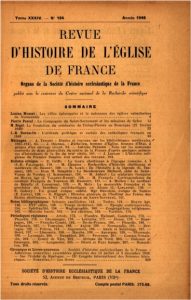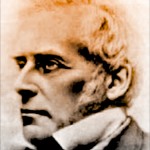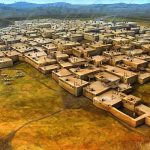 ‘After These Things’ Chapter 3.3 What did John Nelson Darby and the Brethren hold?
‘After These Things’ Chapter 3.3 What did John Nelson Darby and the Brethren hold?
From our book ‘After These Things – Summaries of John Nelson Darby’s Papers on Prophecy – and more…’ Compiled by Daniel Roberts. For more about this book click on the picture or CLICK HERE
 A summary by Sosthenes of a letter entitled ‘ A letter to the Editor of Le Français’ – published in J N D’s letters Volume 2 page 431.
A summary by Sosthenes of a letter entitled ‘ A letter to the Editor of Le Français’ – published in J N D’s letters Volume 2 page 431.
3.3 The Beliefs of Darby and the ‘Brethren’
Darby’s Reply to ‘Le Français’
What the Faithful should understand
What did John Nelson Darby and the Brethren hold?
The following is a summary of a letter entitled ‘A letter to the Editor of Le Français’ – published in J N D’s Letters Volume 2 page 431.
In 1878 the editor of ‘Le Français’, a catholic newspaper wrote to J N Darby asking him about what he and the brethren held. Although he did not like writing articles for newspapers, believing that they were not compatible with the Christian’s heavenly calling, Darby said, ‘I have given him in all simplicity what he asked for. He avowed himself a Catholic and devoted to Catholicism. His letter was simple and honest: I replied to him as a Christian.’
Darby’s Reply to ‘Le Français’
Darby and the brethren held to all the fundamentals of the Christian faith:
- There is one God, eternally blessed – Father, Son and Holy Spirit.
- The Lord Jesus was and is human and divine. He was born of a virgin. Having made propitiation for our sins, He was raised from the dead and is now glorified the great High Priest, seated at the right hand of the Majesty on high.
- The Holy Spirit, having descended on the day of Pentecost, dwells in believers who are waiting for the promised return of the Lord Jesus.
Darby’s early Christian Days
Following his accident (see Chapter 3.2 above), God gave him to understand that he was in Christ, united to Him by the Holy Spirit. Though he had always accepted that the word of God was the absolute authority as to faith and practice, God had now implanted in his heart the conviction of it. Scriptures which bore on that were:
- ‘At that day ye shall know that I am in my Father, and ye in me, and I in you’ (John 14:20)
- ‘He that is joined unto the Lord is one spirit’ (1 Corinthians 6:17)
- ‘Your body is the temple of the Holy Ghost who is in you’ (1 Corinthians 6:19)
- ‘There is therefore now no condemnation to them which are in Christ Jesus’ (Rom 8:1)
- ‘I will come again and receive you unto myself; that where I am, there ye may be also’ (John 14:3)
- ‘Having believed, ye have been sealed for the day of redemption’ (Ephesians 1:13)
- ‘For by one Spirit are we all baptised into one body’ (1 Corinthians 12:13)
- ‘Even when we were dead in sins, he hath quickened us together with Christ, (by grace ye are saved)’ ( 2:5)
- ‘Our citizenship is in heaven; from whence also we look for the Lord Jesus Christ as Saviour, who shall transform our body of humiliation into conformity to his body of glory’ (Phil 3:20-21)
From the above scriptures, he deduced that the Holy Spirit had given us as believers the full assurance of salvation. We have been set apart from this world, sealed to do God’s will here. We are citizens of another world, awaiting the return of our Lord and Saviour.
The body of Christ is composed of those who are united by the Holy Spirit to the Head – Christ in heaven. We are seated in the heavenly places in Christ, and are already there in spirit, just waiting to be taken there, our bodies changed.
The Public Church
This brings us to the thought of the church and of its unity.
Let us look around! We see how far we as Christians have got from what God had set up on the earth. Where is the church? Darby said it was not the national churches ( Anglicanism in Britian etc.). In his early days, he had been attracted to Rome. But then he realised that the idea of a sacrificing priesthood down here was inconsistent with Hebrews 10:14-18 ‘For by one offering he hath perfected for ever them that are sanctified… . Now where remission of these is, there is no more offering for sin’. Rome pretended to be the whole, but excluded half or more of Christendom. Protestant sects were divided amongst themselves – unity was not possible. In fact, most of those who call themselves Christians were as much of the world as atheists or pagans.
The Fall of the early Church
The Church was formed on the earth at the descent of the Holy Spirit. It ought to have been clearly identifiable, distinct, separate from the world. Alas, this has not been the case. The Lord foresaw this: ‘The wolf catcheth them and scattereth the sheep’ (John 10:12) but, thank God the same faithful Shepherd also said, ‘No one shall catch them out of my hand’ (v.28).
In the beginning, ‘the Lord added to the church daily such as should be saved’ (Acts 2:47). Soon false brethren crept in, tares were sown, the house was filled with unholy vessels, from which the faithful were to purge themselves. These were persons with a form of godliness without the power, from which the faithful were to turn away (See 2 Timothy 2:20-22 and ch. 3:1-5)
The apostle Paul, bidding farewell to the faithful of Asia, said, ‘I know this, that after my departing shall grievous wolves enter in among you, not sparing the flock, and of your own selves shall men arise, speaking perverse things, to draw away disciples after them.’ (Acts 20:29-30). Moreover, Jude noted that deceitful men had crept in among the Christians, ‘Certain men crept in unawares, who were before of old ordained to this condemnation, ungodly men’ (Jude v.4). This would lead to apostasy, those inside the public confession entirely abandoning the Christian faith. John continued this line in his epistles.
What the Faithful should understand
Paul tells us, ‘Nevertheless the foundation of God standeth sure, having this seal, The Lord knoweth them that are his. And, Let every one that nameth the name of the Lord depart from iniquity. But in a great house there are not only vessels of gold and of silver, but also of wood and of earth; and some to honour, and some to dishonour. If a man therefore purge himself from these, he shall be a vessel to honour, sanctified, and meet for the master’s use, and prepared unto every good work’ (2 Timothy 2:19-21).
The public church is a great house with vessels of all kinds: a call comes to the faithful man to purify himself from the vessels to dishonour. In the next chapter, he speaks of perilous times. Men will be lovers of their own selves, covetous, boasters, proud etc., but also ‘Having a form of godliness, but denying the power thereof’ (2 Timothy 3:5). They were evidently in the professing church, not pagans as in Romans 1. And it goes on, ‘All that will live godly in Christ Jesus shall suffer persecution. But evil men and seducers shall wax worse and worse’ (2 Timothy 3:12, 13); but true believers have assurance through the scriptures, given by inspiration of God, making them wise to salvation, by the faith which is in Christ Jesus.
However, Satan will not destroy what Christ has built, the house made of living stones, and the holy temple in the Lord (See 1 Peter 2:5 and Ephesians 2:21). The Word declares that where two or three are gathered to the name of Jesus, He would be in their midst. (See Matthew 18:20).
The early Brethren
This is what Darby recognised. Initially, only four met together, not in a spirit of pride or presumption, but deeply grieved at seeing the state of that which surrounded them and praying earnestly about it. Darby said they were not thinking of forming a new sect. Indeed, they did not believe that the thing would have gone any further. They were just satisfying the need of their souls according to the word of God and found the promised presence of the Lord.
As the Holy Spirit stirred up the consciences of exercised believers, similar gatherings sprung up. The work extended in a way they did not expect – in throughout most of Europe, the British Colonies, the United States, and elsewhere. As the gospel was preached, the Spirit of God acted and produced soul yearnings that the established religious systems could not meet.
Those brethren rested on the authority of the word of God. They saw our Saviour:
- first as accomplishing redemption on the cross,
- then as seated at the Father’s right hand, the Holy Ghost being down here,
- and finally, as coming back to take His own to be with Himself.
Nobody would be received into fellowship who denied any of these fundamental truths, and any who undermined them would be excommunicated. They are essential to living faith and salvation, and to the life which all Christians live as born of God
These Christians had the full assurance of their salvation They had faith in the efficacy of Christ’s redemption, and being sealed with the Holy Spirit, were waiting for the Son of God to come from heaven without knowing when it would happen. Bought with a high price, they felt bound to regard themselves as no longer belonging to themselves, but to please the Lord Jesus in everything, and to live only for Him.
The Brethren’s Walk
While Darby had to admit that not all the brethren walked at the full height of the heavenly calling, they acknowledged the obligation to do so. Brethren walked in a morally right way, excluding any who held heresy or engaged in immorality. They abstained from the pleasures and amusements of the world. Evening parties would be occasions of encouraging one another and discussing the word. Brethren did not vote or get involved in politics. They submitted to the established authorities, whatever political colour they may be, so long as they were not called upon to act contrary to the will of Christ. They took the Lord’s supper every Sunday, and those who had gift taught from the scriptures and preached the gospel of salvation to sinners. Everyone felt bound to seek the salvation or good of his or her neighbour, as they were able. Feeling that Christendom was corrupt, they were not of the church-world.
Asked as to how many such believers followed this course, Darby had no idea. Brethren did not number themselves, wishing to remain in the littleness which becomes Christians. In any case, they reckoned as a brother or sister in Christ, every person who had the Spirit of Christ.
Conclusion
Darby stated, ‘What is the advantage of this course? We acknowledge Christ as the Son of God and know that we have been saved by Him. In obeying Him, despite our weakness, faults and failures, we have Him as an indescribable source of joy. Looking ahead, we have an earnest or advance of eternal happiness, with no failures, where our Lord will be fully glorified in all believers’
Postscript
It is over 140 years since the letter referred to above was written. Much has transpired and most readers of this book will be aware of, or be associated with, ‘brethren’ in one form other. This is not the place to go into the history of ‘brethrenism’, with its many sad divisions. Amongst ‘so-called’ brethren (who should eschew sectarianism or any claim to ecclesiastical status), there are thousands of true lovers of our Lord Jesus who seek to please Him, serve Him and praise Him for who He is and what He has done. Human ambition and politics, a state of loveless exactitude (Ephesus) or lukewarm self-satisfaction (Laodicea) has resulted in scattering. Darby noted that when things were left in man’s hands they always fail. But the Lord knows those who are His. (see 2 Timothy 2:19). One of the hymns brethren use goes:
What will it be when all life’s toil is finished,
And we have entered our eternal rest;
When past for ever is the night of weeping,
And with Thee, Lord, we are for ever blest!
What will it be when all the strife is over,
And all Thy saints, now scattered far and wide,
Shall be without one shade of variation,
All like Thee, Lord, united by Thy side!
Annie Ross (1870-1955)
Little Flock Hymn Book (1962/1973) No 421 v. 1-2.









